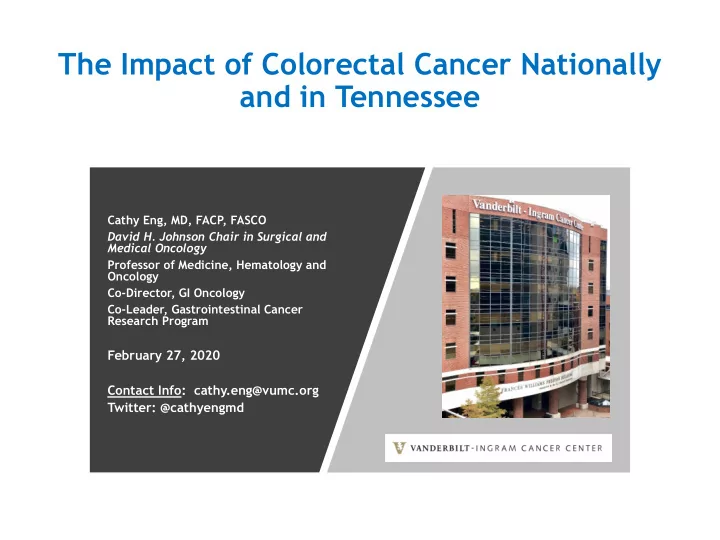

The Impact of Colorectal Cancer Nationally and in Tennessee Cathy Eng, MD, FACP, FASCO David H. Johnson Chair in Surgical and Medical Oncology Professor of Medicine, Hematology and Oncology Co-Director, GI Oncology Co-Leader, Gastrointestinal Cancer Research Program February 27, 2020 Contact Info: cathy.eng@vumc.org Twitter: @cathyengmd
Incidence of Colorectal Cancer: 2019 2020 New CRC cases: 147,950 Rectal cancer: 43,340 https://www.cancer.org/content/dam/cancer-org/research/cancer-facts-and-statistics/annual-cancer-facts-and-figures/2020/cancer-facts-and-figures-2020.pdf
Colorectal Risk Groups FAP 1% IBD 1% HNPCC 5% FH 15% – 20% Sporadic average risk ~75% Sporadic = men and women ≥50 years with average risk; IBD = inflammatory bowel disease; FAP = familial adenomatous polyposis; HNPCC = hereditary nonpolyposis CRC; FH = positive family history. Adapted from Winawer SJ et al. J Natl Cancer Inst. 1991;83:243-253.
https://seer.cancer.gov/statfacts/html/colorect.html
https://seer.cancer.gov/statfacts/html/colorect.html
Incidence by Age https://seer.cancer.gov/statfacts/html/colorect.html
Incidence by Age https://seer.cancer.gov/statfacts/html/colorect.html
Increasing Disparities in Age-Related Incidence of Colon and Rectal Cancer in the United States, 1975-2010 SEER: 1975-2010 Rectal; Rectosigmoid Cancer Colon Cancer Bailey et al. JAMA Surg . 2015.
International Trends in Colon (Fig A) and Rectal Cancer (Fig B): 1988-2007 Liu et al. Cancer Epidemiol Biomarkers Prev . 2019;28(8):1273-1273.
Age-standardized incidence rate during 2008 – 2012 for colorectal cancer among adults ages 20 – 49 years Siegal et al: Gut, 2019
Average annual per cent change (AAPC) in colorectal cancer incidence by age during the most recent 10 years of available data Siegal et al: Gut, 2019
Common Cancers in Tennessee 2011-2015 https://www.tn.gov/content/dam/tn/health/program-areas/reports_and_publications/2019_Cancer_Report.pdf
Facts about Colorectal Cancer in Tennessee • According to the 2014 Behavioral Risk Factor Survey System (BRFSS), only 68.7% of age appropriate Tennesseans (> 50 y/o) had a colorectal endoscopy in their lifetime – 14.1% indicated they had a blood stool test within the past two years • From 2011- 2015, Tennesseans had a 5.3% chance (1 out of every 19 individuals probability of developing colorectal cancer) and a 2.1% probability of dying from colorectal cancer in their lifetime. • Tennesseans who died of colorectal cancer died on average 7.5 years earlier than expected.
Colorectal Cancer Screening in Tenn https://www.cdc.gov/cancer/ncccp/screening-rates/pdf/colorectal-cancer-screening-tennessee-508.pdf
Stage of Colorectal Cancer Presentation in Tenn (2011-2015)
Age-Adjusted CRC Cancer Incidence and Mortality Rates in Tenn 2011-2015 https://www.tn.gov/content/dam/tn/health/program-areas/reports_and_publications/2019_Cancer_Report.pdf
Conclusions • Colon cancer is largely a preventable cancer • Invasive procedures: – A colonoscopy remains the “gold” standard – A flexible sigmoidoscopy will miss transverse colon/right sided tumors • Right sided tumors have worse OS for stage IV patients. – Virtual colonoscopy has limitations • Non-invasive procedures: – FOBT • False positives • Not specific for site of blood – FIT/DNA (Cologuard) • Specific for lower GI tract • Any screening is better than no screening! • March is Colorectal Cancer Awareness Month – Remember a colonoscopy can save a life!
Recommend
More recommend